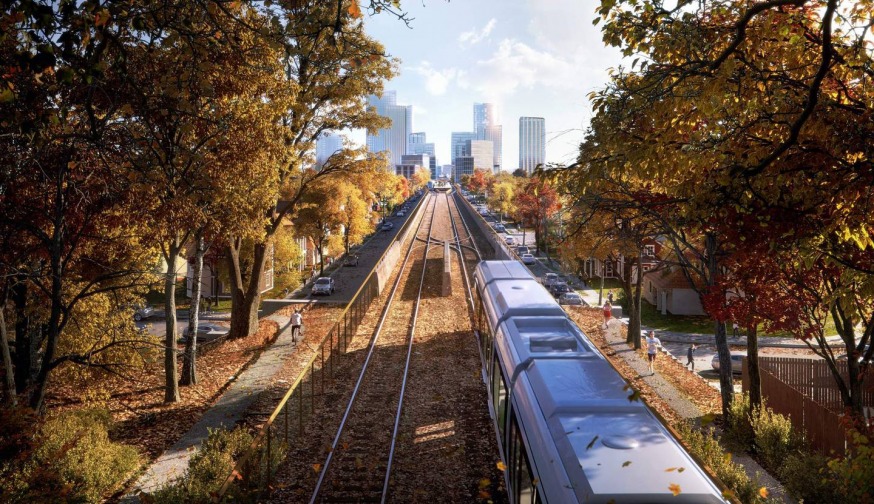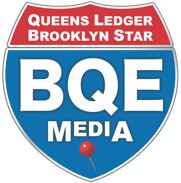Op-Ed: Double down MTA, Queens needs more trains
By Juan Ardila, Assembly District 37 Elect

QNS rendering via Friends of the QNS.
Give credit where credit is due with the Interborough Express proposed by Gov. Hochul: For a governor to finally take notice of an underused freight-rail line running from Brooklyn into Queens, and pushing to convert that line to passenger rail, is an idea whose time has finally come.
The IBX, as proposed, would run 14 miles through these two boroughs without going through Manhattan. The governor and the MTA, in other words, are taking a real interest in helping all New Yorkers with their daily commute, and not just those traveling to Manhattan.
Moving away from Manhattan-centered planning is what Queens and the outer boroughs have long deserved, and addressing the mass transit needs of some of our long-marooned communities simply makes sense.
Converting this long right-of-way from freight to commuter rail, as opposed to asking the MTA to build out entirely new and expensive infrastructure, is cost-effective.
It also makes environmental sense as it helps to alleviate our city’s dependence on automobiles, which currently crowd our streets and highways.
Lastly, it makes economic sense, because the city benefits when more people have better mass-transit access to jobs, schools and other essential places like daycares and hospitals.
But I implore the governor and the MTA: Don’t stop there. Keep going and double down by revisiting the QNS plan, a recently studied proposal to reactivate and repurpose freight rail along the Lower Montauk Branch which runs through central Queens and can connect Long Island City to nearby neighborhoods like Maspeth, Ridgewood, Middle Village — all the way to Jamaica.
The governor can help us make Queens, the MTA’s most underserved borough after Staten Island, the sort of inter-connected, environmentally friendly, economic powerhouse it was meant to be.
The IBX and the QNS lines are also remarkably similar. Both are publicly owned right-of-ways that have been used sparingly for years by freight-rail companies.
Both can be converted comparatively cheaply, by infrastructure-expense standards, to include passenger service, sharing the same space with freight.
Passenger service can run during the day and freight can run in the off-hours. The QNS would be 90 percent less expensive to build out per mile than the Second Ave. subway plan by comparison.
Moreover, both the IBX plan and the QNS both call for a planned stop at Metropolitan Ave. in Middle Village, which could turn this growing neighborhood into a mass transportation hub.
If both lines are built, a 14-mile line would have 23 miles of new interconnectivity. This would be groundbreaking for those who live along these lines.
Right now, many of the areas where the unused QNS line lies are commonly referred to as transit deserts. What’s it like to live in a transit desert? I happen to know because I live in Maspeth. I can walk faster than most of the local buses through my neighborhood. People around here own cars out of necessity, not as a luxury. That’s not how New Yorkers should live.
This is no charity request either. Queens’ population has been exploding in recent decades.
Long Island City is one of the fastest-growing neighborhoods in all of America, period, while neighborhoods like Ridgewood and Jamaica are only getting more populated.
Neighborhoods along the QNS line are home to thousands of workers from all trades who are looking for better ways to get around. Approximately 95,000 existing jobs and three of NYC’s most important industrial business zones lie within a half-mile of the QNS line, so if both the IBX and the QNS are built, those workers will have a real chance of finding better jobs across the entire region with greater access to mass transportation.
What’s more, the nonprofit advocacy group Friends of the QNS, which has been promoting reactivating the Lower Montauk line for more than half a decade, has spent this summer working with a bicycle advocacy group here in Queens to promote a greenway that could be added alongside the train line.
The DOT and the MTA should review these proposals, because, despite all the pressures and complaints from drivers about congestion and parking, we have to find a way to share our city with bikes and other alternative forms of transportation.
I was glad to see that the QNS line was included in the MTA’s list of ideal projects in its 20-year Needs Assessment report (a 2018 DOT feasibility report has already made it clear that the proposal is feasible).
Rather than simply adding it onto a long list of to-do projects that may never get done, let’s make this one happen.


